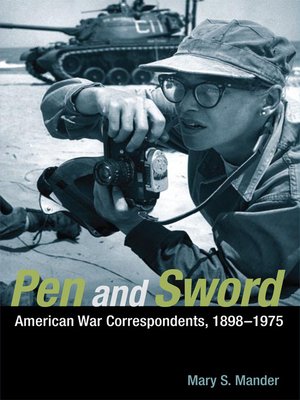
Sign up to save your library
With an OverDrive account, you can save your favorite libraries for at-a-glance information about availability. Find out more about OverDrive accounts.
Find this title in Libby, the library reading app by OverDrive.



Search for a digital library with this title
Title found at these libraries:
| Library Name | Distance |
|---|---|
| Loading... |
Addressing the ever-changing, overlapping trajectories of war and journalism, this introduction to the history and culture of modern American war correspondence considers a wealth of original archival material. In powerful analyses of letters, diaries, journals, television news archives, and secondary literature related to the U.S.'s major military conflicts of the twentieth century, Mary S. Mander highlights the intricate relationship of the postmodern nation state to the free press and to the public. Pen and Sword: American War Correspondents, 1898-1975 situates war correspondence within the larger framework of the history of the printing press to make perceptive new points about the nature of journalism and censorship, the institution of the press as a source of organized dissent, and the relationship between the press and the military. Fostering a deeper understanding of the occupational culture of war correspondents who have accompanied soldiers into battle, Mander offers interpretive analysis of the reporters' search for meaning while embedded with troops in war-torn territories. Broadly encompassing the history of Western civilization and modern warfare, Pen and Sword prompts new ways of thinking about contemporary military conflicts and the future of journalism.|
Cover
Title
Copyright
Contents
Acknowledgments
Abbreviations
Introduction
1. The Historical Context for Understanding American War Correspondents
2. Early Encoding of State-Administered Censorship During Wartime, 1898-1916
3. Censorship During the World Wars
4. Censorship in Vietnam
5. The Culture of Press Censorship During Wartime
6. Experience and Interpretation
7. The Occupational Culture of the American War Correspondent
Conclusion
Further Reading
Notes
Bibliography
Index
|
"A stimulating inquiry into the place of war correspondents in twentieth-century American life. Part history and part theory, Mary S. Mander's work is provocative. Her effort to recover the voices of journalists and the dance between them and the military and government is extremely important."—Owen V. Johnson, coauthor of Eastern European Journalism: Past, Present, and Future
|Mary S. Mander is a professor emeritus of communications at The Pennsylvania State University and the editor of Framing Friction: Media and Social Conflict.
|Mary S. Mander is a professor emeritus of communications at The Pennsylvania State University and the editor of Framing Friction: Media and Social Conflict.







